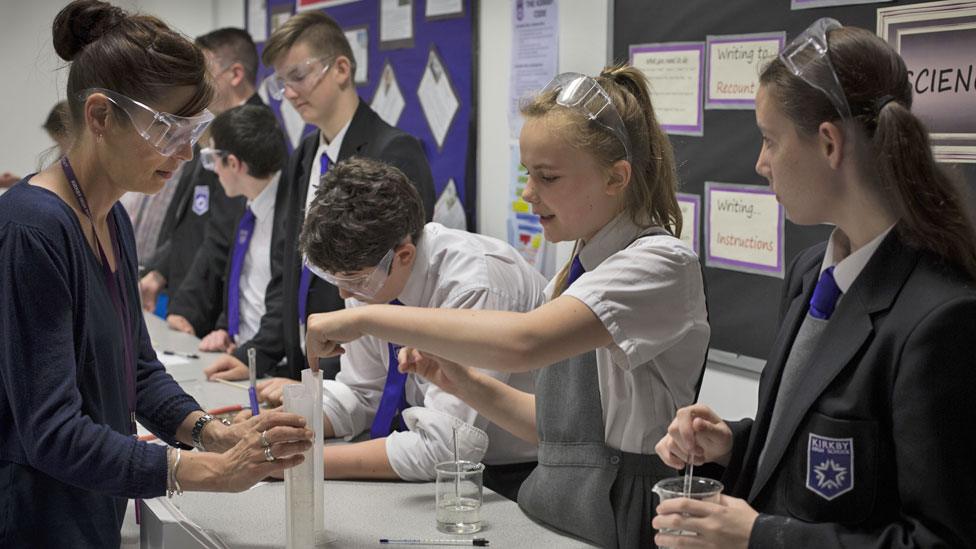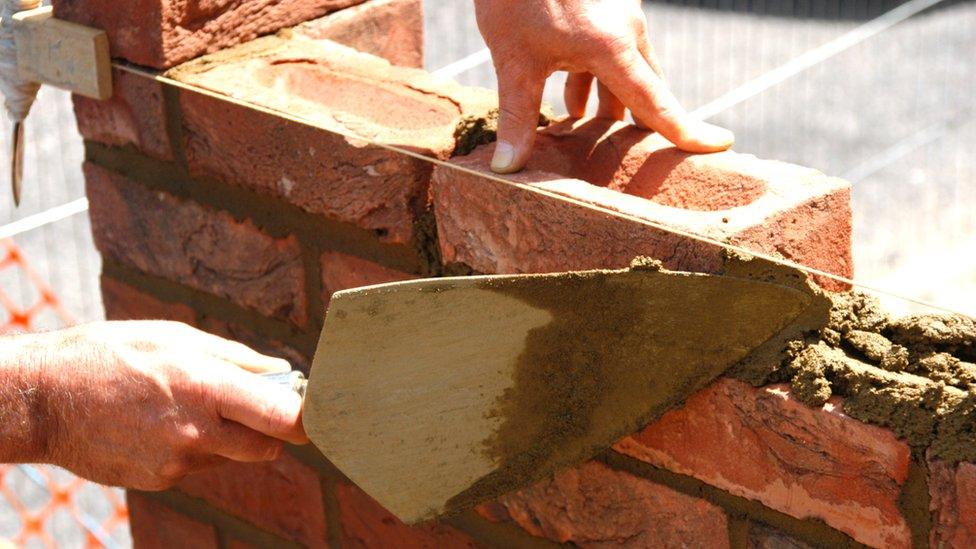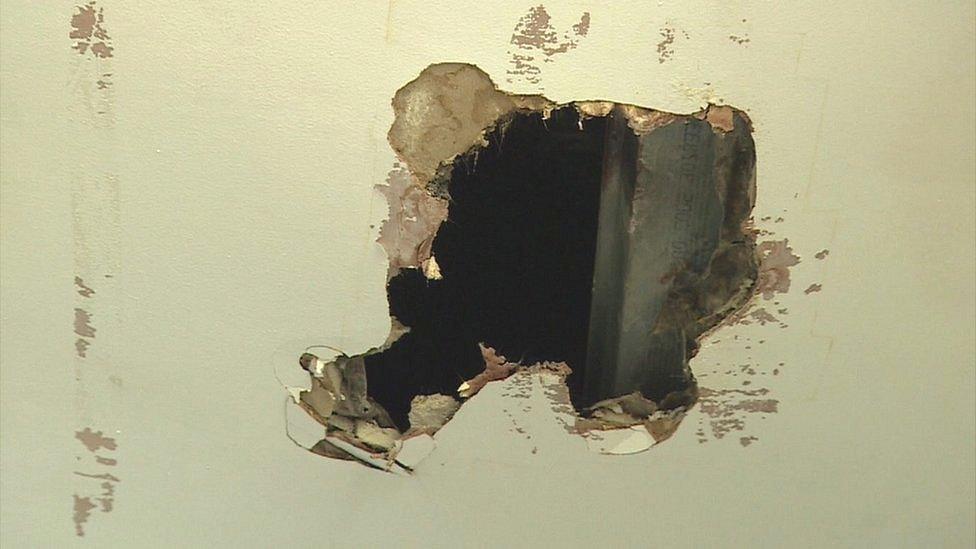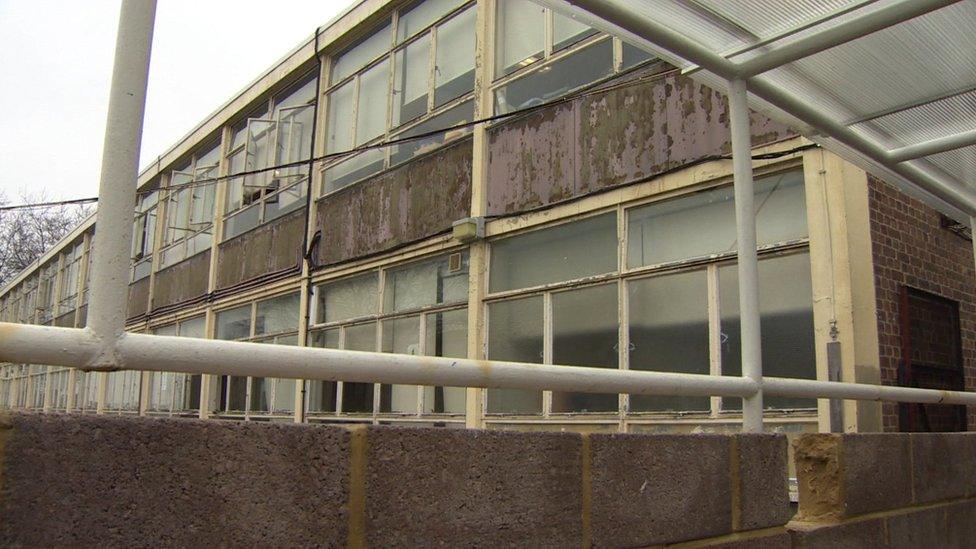PM Boris Johnson promising £1bn to rebuild crumbling schools
- Published
- comments

Head teachers have warned that funding for school repairs is long overdue
Funding of £1bn for 50 major school building projects in England is being promised by the prime minister.
There will also be a further £560m for repairs to crumbling school buildings.
"It's important we lay the foundations for a country where everyone has the opportunity to succeed," said Boris Johnson.
But head teachers said the National Audit Office had identified a backlog of £6.7bn repairs needed across England's 21,000 schools.
Education Secretary Gavin Williamson also addressed whether there would be social distancing when all pupils return to school full time in the autumn.
"It's not about 1 metre, it's not about 2 metres," he told BBC Breakfast, saying that safety was based on "reducing the number of transmission points" within schools for Covid-19 infections.
This would mean whole classes becoming "bubbles" separated from other pupils, he suggested, with a promise to address the more "complex" arrangements needed for secondary school, where pupils "criss-cross" between different sets and subjects.
He also promised there would be "comprehensive plans in terms of both testing and tracing."
That could mean local closures of schools or sending home individual year groups in response to Covid-19 infections, Mr Williamson told BBC Radio 4's Today programme.
The school rebuilding programme, launched by the prime minister on Monday, will tackle the problems of ageing, dilapidated school buildings and also the need to create extra spaces for rising numbers of secondary age pupils.
The 50 school building projects, which will be identified later in the year, will have £1bn in funding - the first phase of what is planned as a 10-year programme.
The first of the 50 school projects will begin construction in September 2021 - but without any specified time frame for when they might all start or be completed.
There will be an extra £560m for upgrades and repairs to schools for the next academic year - and £200m for improving further education colleges, which was previously announced, will be brought forward.

There have been warnings that many school buildings are reaching "the end of their useful lives"
"This major new investment will make sure our schools and colleges are fit for the future, with better facilities and brand new buildings," said Mr Johnson.
Geoff Barton, leader of the ASCL head teachers' union, welcomed a "significant step in the right direction" - but said "far too many children are studying in buildings that are not fit for purpose".
He warned that repairs were "desperately needed and long overdue" - and highlighted the concerns raised three years ago by the public spending watchdog, the National Audit Office, - saying that the problems would have "worsened" since then.
In a report from 2017, the NAO warned of deteriorating school buildings - and said it would cost £6.7bn to bring buildings to a "satisfactory" level and a further £7.1bn to bring them up to a "good condition".
It reported that many school buildings were "near the end of their useful lives" - and that major defects were likely to increase.
Following that 2017 NAO warning, the government announced £2.4bn for school repairs and extra places.
Paul Whiteman of the National Association of Head Teachers backed the extra funding after a "decade of underinvestment" and warned that school funding must "never be allowed to fall into such a perilous state again".
Labour leader Sir Keir Starmer said the Conservatives' "record on building and investment has been a lost decade".
The party said all regions of England had seen a fall in the amount of education investment per person since the Conservatives came to power in 2010.
Layla Moran, Lib Dem education spokeswoman, said the promises were "spin over substance" and that schools needed "urgent investment" rather than "vague numbers pulled out of thin air".
The Department for Education says the funding for improving buildings is part of a wider investment in schools - including £650m for catch-up funding after the coronavirus and £350m for a tutoring service.
There has also been a commitment to increase school spending by £7.1bn by 2022-23 - which the Institute for Fiscal Studies says will reverse previous cuts to school budgets.
- Published4 July 2018

- Published22 February 2017
